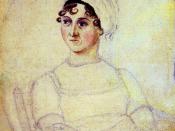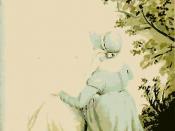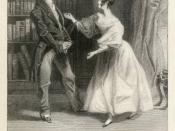Jane Austen's moral concerns are ever present in the major themes of Pride and Prejudice and Emma, and by incorporating them into her novels she is symbolizing real life - or what was real life for her then.
Austen portrays the family as primarily responsible for the moral and intellectual education of children. Failure to do so properly has severe consequences. Mr. and Mrs. Bennet's failure to provide this education for their daughters leads to the complete shamefulness and silly delight of Lydia, whose sister Kitty is following closely in her frolicking footsteps, and to the overwhelming insecurity of their third daughter, the wannabe intellectual, Mary. Elizabeth and Jane, the two eldest daughters, have managed to develop many good qualities and strong, admirable characters in spite of the carelessness of their parents, perhaps through the help of their studies and the good influence of Mr. and Mrs. Gardiner, who are the only relatives in the novel that work towards the education of the daughters, leading them when in need of help with good advice and judgment.
Elizabeth and Jane are constantly forced to put up with the foolishness and poor judgment of their mother and the sarcastic indifference of their father. Even when Elizabeth advises her father not to allow Lydia to go to Brighton, he ignores the advice because he thinks it would too difficult to deal with Lydia's complaining. The result is the scandal of Lydia's elopement with Wickham.
Emma also suffers from the irresponsibility of her family. Because her mother died when she was just a baby, she was raised by her father and governess, the newly married Mrs. Weston and former Miss Taylor. Her father, a ridiculous valetudinarian, never challenged or questioned her and her actions, and only praised her, and so she was raised to...



Nice job
very very good, i really like it.
1 out of 1 people found this comment useful.